Introduction
Multi-level marketing isn’t going away. In fact, some of the top MLM companies in 2025 are bigger than ever, pulling in billions of dollars and attracting millions of distributors worldwide. From household names like Amway and Avon to wellness-focused giants like Herbalife and Nu Skin, MLM continues to thrive despite ongoing controversy.
But here’s the catch: not every MLM is worth your time. Some operate as legitimate businesses with real products and retail customers. Others walk a fine line with practices that look a lot more like pyramid schemes and that can mean wasted money, lost trust, and plenty of frustration for anyone who joins.
If you’re researching MLM opportunities this year, you need to know which companies are considered stable and product-driven, and which ones are best avoided.
Key Takeaways
- A list of the top MLM companies in 2025 that dominate the industry.
- What makes an MLM company legit vs. risky.
- Examples of MLMs with red flags and past controversies.
- How to spot warning signs before joining any MLM.
- Whether joining one of the top MLMs is still worth it in 2025 and what alternatives exist.
Disclaimer: I am an independent Affiliate. The opinions expressed here are my own and are not official statements. If you follow a link and make a purchase, I may earn a commission.
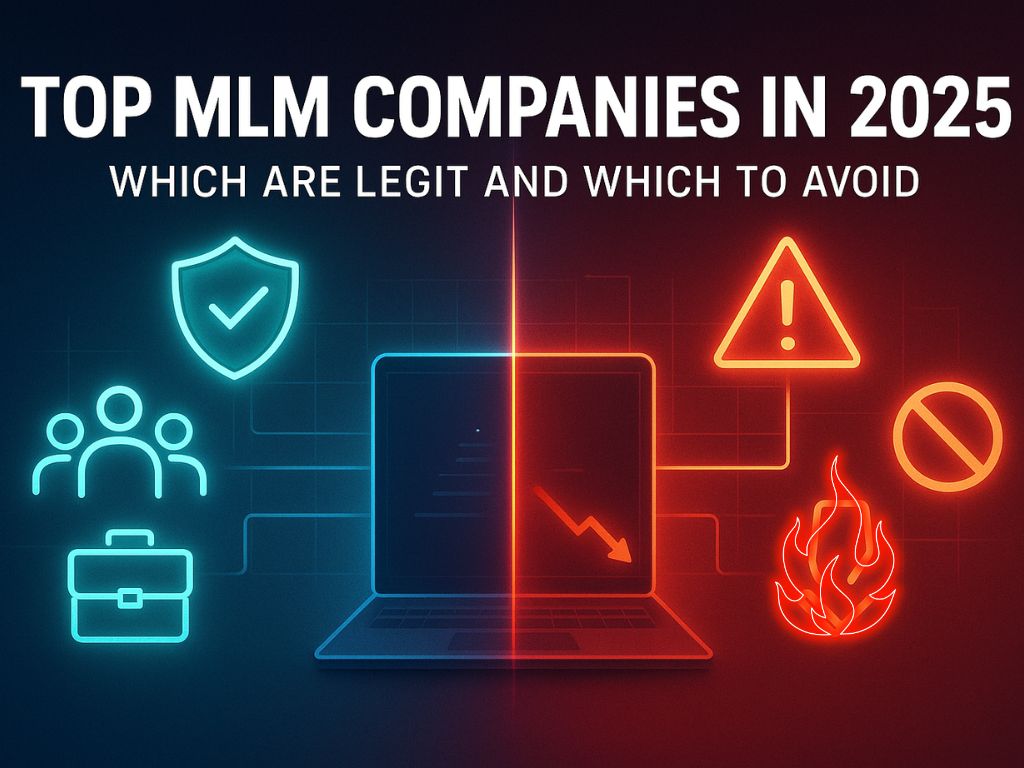
What Makes an MLM Company Legit?
Before we look at the top MLM companies in 2025, it’s important to understand how to tell the difference between a legitimate business and one that might cross into pyramid scheme territory.
Here are the key factors that separate a legit MLM from a shady one:
1. Product-Driven, Not Recruitment-Driven
A legitimate MLM makes most of its money from real product sales to customers outside the network. If the company mainly rewards you for recruiting people and not for selling that’s a red flag.
2. Transparent Compensation Plan
Reputable MLMs provide a clear, easy-to-understand pay structure. If it feels overly complicated, vague, or skewed toward recruitment bonuses, be cautious.
3. No Mandatory Large Purchases
Legit companies don’t require you to buy thousands of dollars in inventory or force you into costly monthly “autoships.” If you can’t stay active without spending big money, it’s a warning sign.
4. Long-Term Stability
The top MLM companies have been around for decades. If a new company pops up promising “ground-floor opportunities,” it might disappear just as quickly.
5. Regulatory Compliance
Legitimate MLMs comply with FTC guidelines and industry regulations. They avoid making exaggerated income claims and focus on the retail value of their products.
✅ The takeaway: A legit MLM operates like a product-based business with fair pay for sales. A questionable MLM puts heavy emphasis on recruitment, vague promises, and ongoing personal purchases.

Top MLM Companies Overview (2025)
| Company | Est. 2024 Revenue | Primary Focus | Key Differentiators | Critical Context |
|---|---|---|---|---|
| 1. Amway | $7.4 Billion | Health, Beauty, Home | The “Original Giant” with the widest product selection globally. | Critique centers on its complex system and recruitment-heavy culture. |
| 2. Herbalife | $5.0 Billion | Nutrition, Weight Loss | Dominates the shake/supplement market in 90+ countries. | Legally stable now, but faced a massive $200M FTC settlement in 2016. |
| 3. Natura & Co | $4.2 Billion | Beauty, Cosmetics | Owns Avon & The Body Shop; focuses on eco-friendly beauty. | Avon is shifting away from “door-to-door” toward modern e-commerce. |
| 4. Mary Kay | $2.4 Billion | Cosmetics, Skincare | Strong brand identity (Pink Cadillacs) and loyal community. | Less controversial than others, but success requires high sales volume. |
| 5. doTERRA | $2.0 Billion | Essential Oils | Rapid growth; markets itself as a “Wellness Lifestyle” brand. | Praised for product quality, but the average distributor income is very low. |
| 6. Young Living | $1.8 Billion | Essential Oils | The original essential oil giant with a “cult-like” following. | Frequent criticism regarding exaggerated health/income claims. |
| 7. Nu Skin | $1.7 Billion | Anti-aging Skincare | Publicly traded; emphasizes science-backed tech (LumiSpa). | Growing steadily despite past regulatory scrutiny in China and the US. |
Note on Revenue: Figures are estimated based on 2024/2025 financial reports and public filings. Private companies (like Amway and Mary Kay) self-report these numbers.
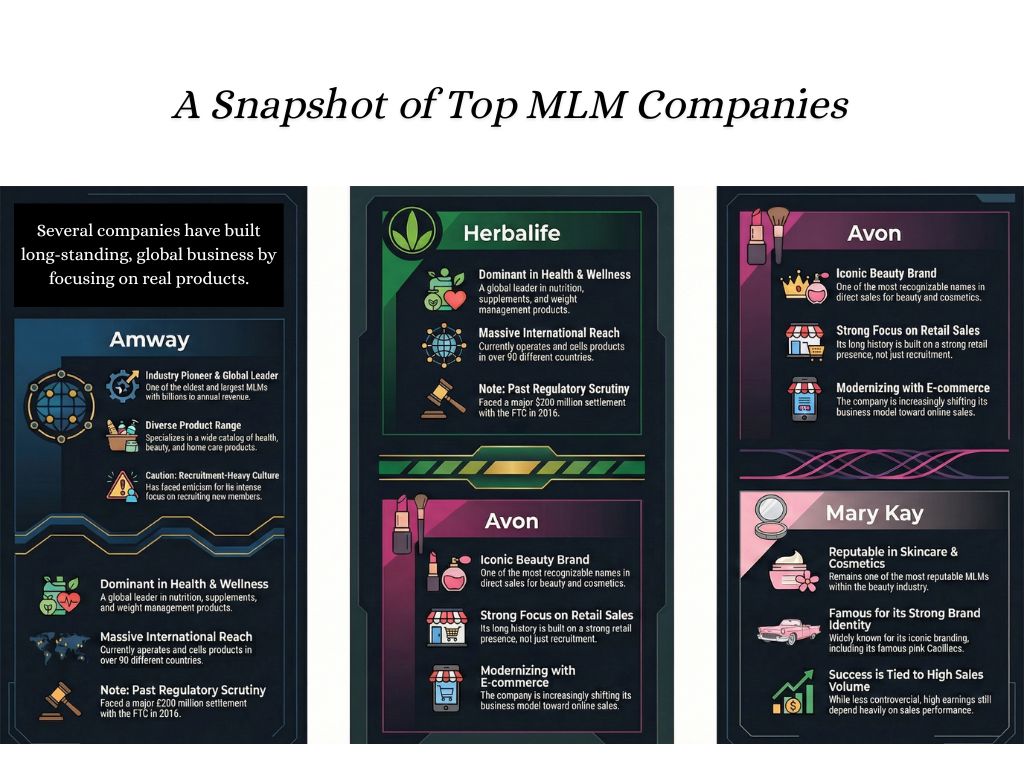
Top MLM Companies in 2025 (Legit Options)
While MLM has its critics, some companies have stood the test of time. These top MLM companies in 2025 generate billions in revenue and continue to attract distributors worldwide. They’re not without controversy, but they’re considered more stable and product-driven than many newcomers.
1. Amway
- Founded: 1959
- Products: Health, beauty, and home care
- Why It’s a Top MLM: One of the oldest and largest MLMs, with global operations and billions in annual revenue. Known for its extensive product catalog.
- What to Know: While successful, Amway has faced criticism for its recruitment-heavy culture.
2. Herbalife
- Founded: 1980
- Products: Nutrition, supplements, weight management
- Why It’s a Top MLM: Herbalife operates in over 90 countries and continues to dominate the health and wellness niche.
- What to Know: Faced a $200 million FTC settlement in 2016, but still legally operating and considered stable.
3. Avon
- Founded: 1886
- Products: Beauty, skincare, cosmetics
- Why It’s a Top MLM: One of the most recognizable names in direct sales. Avon’s long history and strong retail presence set it apart from recruitment-heavy models.
- What to Know: Shifting more toward traditional direct sales and e-commerce in recent years.
4. Mary Kay
- Founded: 1963
- Products: Cosmetics and skincare
- Why It’s a Top MLM: Known for its pink Cadillacs and strong brand identity, Mary Kay remains one of the most reputable MLMs in the beauty industry.
- What to Know: Less controversial than many MLMs, though success still depends heavily on sales volume.
5. Nu Skin
- Founded: 1984
- Products: Skincare, supplements, anti-aging
- Why It’s a Top MLM: A publicly traded company with international reach. Strong focus on science-backed wellness and skincare products.
- What to Know: Has faced regulatory scrutiny in some countries, but continues to grow steadily.
6. Young Living
- Founded: 1993
- Products: Essential oils, wellness products
- Why It’s a Top MLM: Popular among health-conscious consumers, especially in the natural and holistic lifestyle niche.
- What to Know: Faced criticism for income claims, but maintains a large loyal base of distributors.
7. doTERRA
- Founded: 2008
- Products: Essential oils and personal care
- Why It’s a Top MLM: Direct competitor to Young Living with rapid growth and a strong presence in the wellness space.
- What to Know: Praised for quality oils, but like all MLMs, the majority of distributors earn little income.
✅ The takeaway: These companies are considered the top MLM companies in 2025 because they’ve survived decades, built global reach, and offer real products. But even with legitimacy, success still requires significant sales effort and only a small percentage earn high incomes.

Top Trending MLM Companies in 2025
Alongside industry giants like Amway and Mary Kay, a handful of newer MLMs are making waves in 2025.
These companies are smaller but rapidly growing thanks to aggressive online marketing, unique niches, and a surge of interest from younger audiences.
While exciting, they’re also riskier since they don’t yet have the track record of the established players.
1. LiveGood
- Niche: Health supplements, nutrition, and wellness.
- Why It’s Trending: LiveGood has attracted attention with its low-cost membership model for under $10 a month, distributors and customers get discounted access to supplements and health products. The affordability and heavy social media buzz make it appealing to newcomers.
- What to Know: Its rapid growth is fueled by hype, but sustainability is still unproven. Critics argue that low prices could hurt margins and long-term distributor earnings.
⚠️ Regulatory Note: As of mid-2025, LiveGood is under active monitoring by the Direct Selling Self-Regulatory Council (DSSRC) regarding unsubstantiated income claims. The DSSRC has flagged marketing terms like “financial freedom” and “guaranteed income” used by some distributors. If you join, focus on the product value, not the promise of passive wealth.

2. GotBackup
- Niche: Cloud storage and digital backup services.
- Why It’s Trending: Unlike most MLMs selling lotions or powders, GotBackup focuses on digital services offering online backup solutions for families and businesses. This fresh angle sets it apart and has caught the eye of tech-minded distributors.
- What to Know: It’s innovative compared to product-heavy MLMs, but the question is whether customers really want to buy these services through an MLM model when so many alternatives (Google Drive, Dropbox) already exist.
3. iGenius
- Niche: Financial education, forex, and crypto trading.
- Why It’s Trending: Riding the popularity of cryptocurrency and online trading, iGenius positions itself as an MLM that sells “knowledge” instead of physical products. Its appeal is strongest among younger, entrepreneurial audiences eager to learn about investing.
- What to Know: Financial promises always carry high risk. Regulators have scrutinized similar companies in the past, so anyone considering iGenius should proceed with extreme caution.
✅ The takeaway: These trending MLM companies in 2025 represent fresh niches and innovative spins on the MLM model. They may offer opportunities, but their long-term stability is uncertain and the hype surrounding them should be viewed carefully.

MLM Companies to Approach with Caution (High-Risk/Controversial)
Not every MLM that makes headlines is worth your trust. Some companies have faced lawsuits, regulatory crackdowns, or earned reputations for being recruitment-heavy rather than product-driven.
Here are a few MLM companies you should approach with caution in 2025:
1. Advocare
- Founded: 1993
- Products: Nutrition and supplements
- Why to Be Cautious: In 2019, the FTC labeled Advocare a pyramid scheme, forcing it to pay $150 million in fines and shut down its MLM structure. While the brand still exists in a limited capacity, it’s no longer a traditional MLM.
2. Jeunesse Global
- Founded: 2009
- Products: Skincare, anti-aging, health supplements
- Why to Be Cautious: Jeunesse has faced multiple lawsuits and regulatory challenges over income claims and questionable marketing practices.
3. LuLaRoe
- Founded: 2012
- Products: Clothing (leggings, fashion items)
- Why to Be Cautious: Known for rapid rise and equally rapid collapse, LuLaRoe faced lawsuits alleging it was a pyramid scheme and left many distributors with unsold inventory.
4. New/Unknown MLM Startups
- Products: Vary (often vague or overhyped)
- Why to Be Cautious: Many new MLMs launch with flashy promises, only to vanish within a few years. Be extra careful with “ground-floor opportunities”; these are the riskiest.
Comparison Table: Legit vs Controversial MLMs
| Category | Examples | What to Know |
|---|---|---|
| Legit & Established | Amway, Avon, Mary Kay, Herbalife, Nu Skin, Young Living, doTERRA | Decades in business, real products, still risky but more stable |
| Controversial/High Risk | Advocare, Jeunesse, LuLaRoe, New Startups | Regulatory issues, lawsuits, recruitment-heavy, high distributor losses |
✅ The takeaway: Just because an MLM is popular doesn’t mean it’s safe. Some have been shut down or sued, while others operate in a legal gray area. Always research a company’s history before joining.
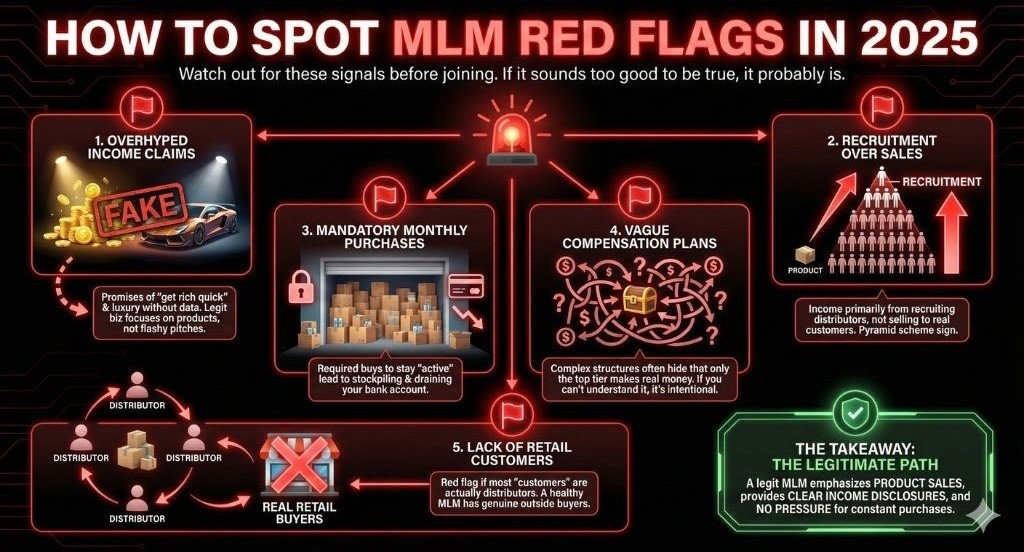
How to Spot MLM Red Flags in 2025
Even among the top MLM companies, not everything is as shiny as it looks in a presentation. Before joining any MLM in 2025, watch out for these red flags that often signal trouble ahead:
1. Overhyped Income Claims
If a company promises you can “get rich quick” or flaunts luxury lifestyles without showing real data, be cautious. Legit businesses focus on products, not flashy recruitment pitches.
2. Recruitment Over Sales
In a legitimate MLM, the majority of income comes from product sales to real customers. If the company puts more emphasis on recruiting new distributors than selling actual products, that’s a sign it could be a pyramid scheme.
3. Mandatory Monthly Purchases
Some MLMs require you to buy a certain amount of products each month to stay “active.” This can quickly lead to stockpiling unsold products in your garage and draining your bank account.
4. Vague or Complicated Compensation Plans
If you can’t understand how you’re paid after reading the plan twice, that’s intentional. Overly complex structures often hide the fact that only those at the top make real money.
5. Lack of Retail Customers
A red flag: if most of the “customers” are actually distributors within the system. A healthy MLM should have genuine retail buyers outside the network.
✅ The takeaway: A legitimate MLM will emphasize product sales, provide clear income disclosures, and not pressure you into constant purchases. If the pitch sounds too good to be true it probably is.
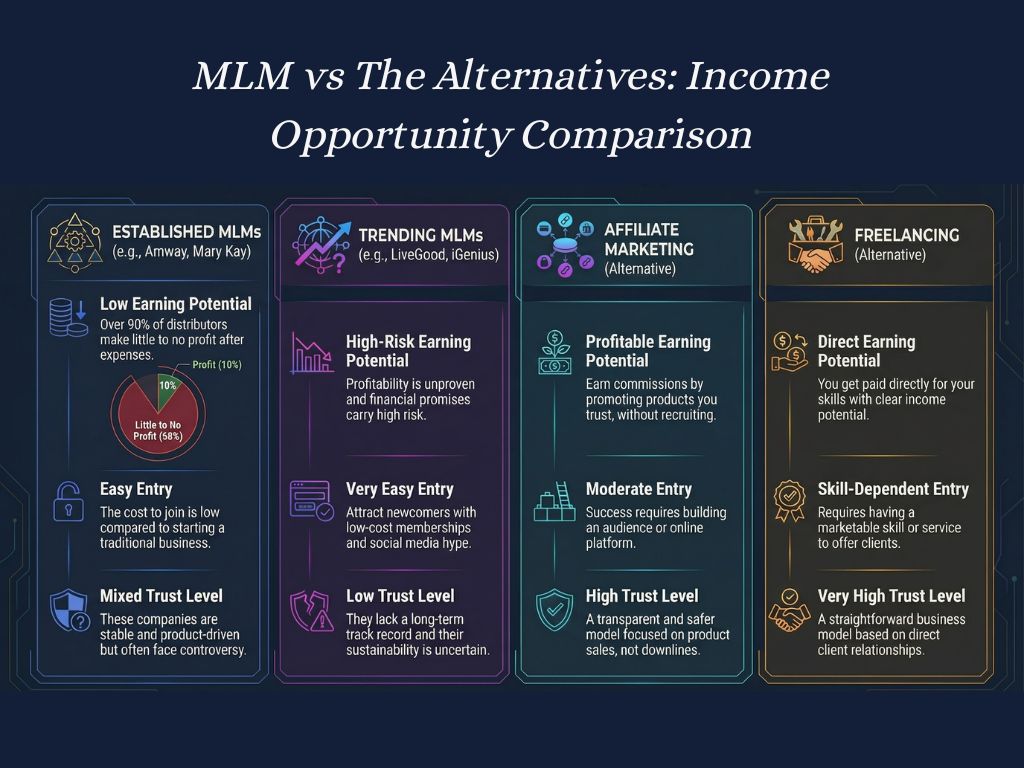
Are MLMs Still Worth Joining in 2025?
After decades of controversy, MLMs are still alive and kicking in 2025. The top MLM companies continue to bring in billions and attract new distributors every year. But the question remains: are they worth your time?
The Case For Joining
- Established MLMs (like Amway, Mary Kay, or Avon) have proven they can survive long-term.
- Some distributors do earn decent income, especially if they’re natural salespeople with strong networks.
- The low cost to join compared to starting a traditional business makes MLMs tempting for beginners.
The Case Against Joining
- Statistics show that 90%+ of distributors make little to no profit.
- Success often depends more on recruitment than product sales.
- The pressure to constantly sell and recruit can strain relationships and lead to burnout.
- Controversial MLMs risk legal action or collapse, leaving distributors stranded.
Better Alternatives in 2025
If your goal is to earn extra income or build a long-term business, consider these options instead:
- Affiliate Marketing → Promote products online, earn commissions without recruiting.
- Freelancing → Offer your skills (writing, design, marketing, etc.) directly to clients.
- E-commerce/Dropshipping → Sell products online without holding inventory.
✅ The takeaway: While some people can succeed in MLM, the odds are stacked against most participants. In 2025, there are safer, more transparent, and more profitable ways to build an income online.

Balance & Trust: The Reality Check
Talking about MLMs in 2025 requires a careful balance. While legacy giants like Amway and Avon offer stability and recognizable products, the industry remains controversial.
The Data: Income disclosure statements and FTC reports consistently show that the vast majority of distributors earn little to no profit. Recruitment-heavy models often leave newcomers disappointed.
How to Spot a “Safe” Opportunity The most trustworthy way to evaluate an MLM is transparency. Look for these three green flags:
- Clear Compensation: Avoid vague promises; look for mathematical clarity on how you get paid.
- Real Sales Data: Does the company share actual customer sales numbers, or just recruitment numbers?
- Regulatory Compliance: Ensure the company complies with regulations in your specific country, as rules vary significantly between the U.S. and abroad.
Bottom Line: Not every MLM is a scam, but not every opportunity is sustainable. Presenting both the potential and the pitfalls helps readers make smarter decisions.

Conclusion
The top MLM companies in 2025 like Amway, Herbalife, Avon, Mary Kay, and Nu Skin have built massive global businesses and stood the test of time. They’re considered more legitimate than smaller startups because they have real products, proven systems, and decades of history behind them.
But even with the biggest names in MLM, the risks remain. Most distributors earn little to no profit, and the pressure to recruit can lead to financial stress and strained relationships.
On the other end of the spectrum, companies like Advocare, Jeunesse, and LuLaRoe highlight what can go wrong when MLMs cross into pyramid-scheme territory.
Bottom line: If you’re set on joining an MLM, stick with established, product-driven companies. But if your goal is to build a reliable income in 2025, safer alternatives like affiliate marketing, freelancing, or e-commerce offer far less risk and far more transparency.
For a deeper look at the MLM model itself, how it works, the pros and cons, and whether it’s really worth joining check out our full guide: Multi-Level Marketing: Still Worth It or a Waste of Time?
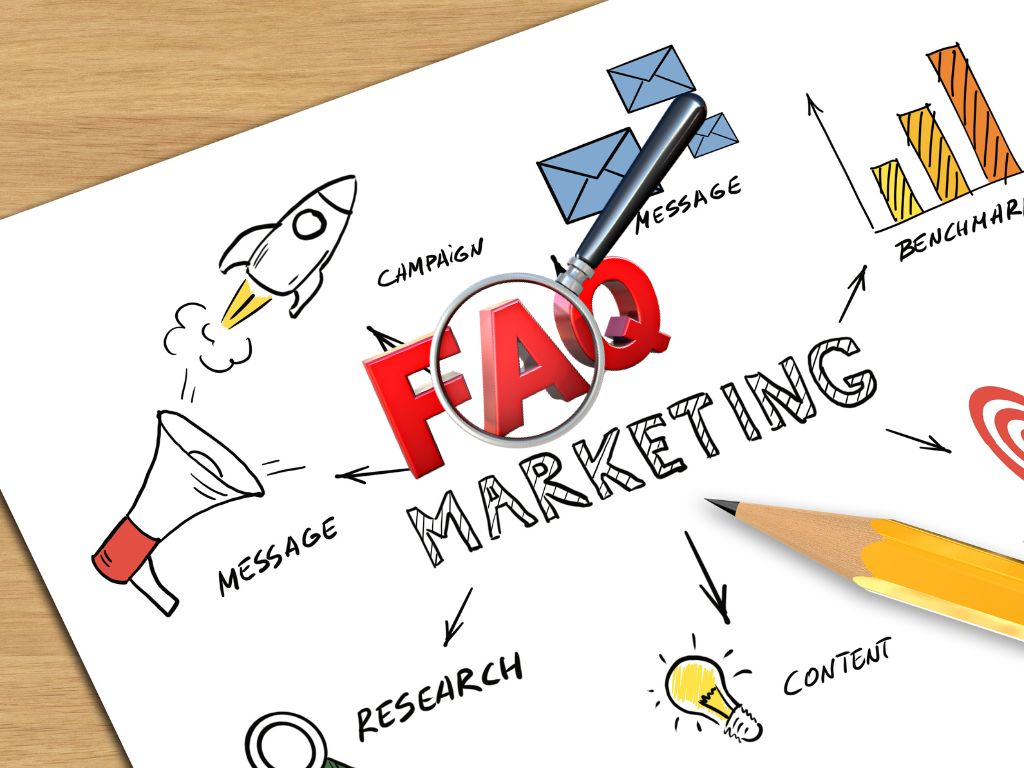
FAQs About the Top MLM Companies in 2025
1. What is the number one MLM company in 2025?
Amway continues to be the largest MLM worldwide, generating billions in revenue annually. Other top competitors include Herbalife, Avon, and Mary Kay.
2. Which MLM companies are banned or considered pyramid schemes?
Advocare was officially labeled a pyramid scheme by the FTC in 2019. LuLaRoe and Jeunesse Global have also faced lawsuits and controversies that damaged their reputations.
3. How can I tell if an MLM company is legit?
Look for product-driven income, not recruitment-driven promises. Legit MLMs focus on selling to real retail customers, have transparent pay plans, and don’t pressure you into buying excessive inventory.
4. Can you really make money with the top MLM companies?
It’s possible, but rare. Even with established MLMs, most distributors earn little to no profit after expenses. Only a small percentage achieve significant income.
5. What are safer alternatives to MLM in 2025?
Affiliate marketing, freelancing, and e-commerce offer lower risk, clearer income potential, and don’t rely on recruiting friends or family.
1 Comment
MLM Recruiting Exposed: Tactics, Psychology, and the Real Numbers - Ismel Guerrero. · October 21, 2025 at 10:19 am
[…] many MLM companies emphasize product quality and personal use, the structure of most compensation plans reveals […]